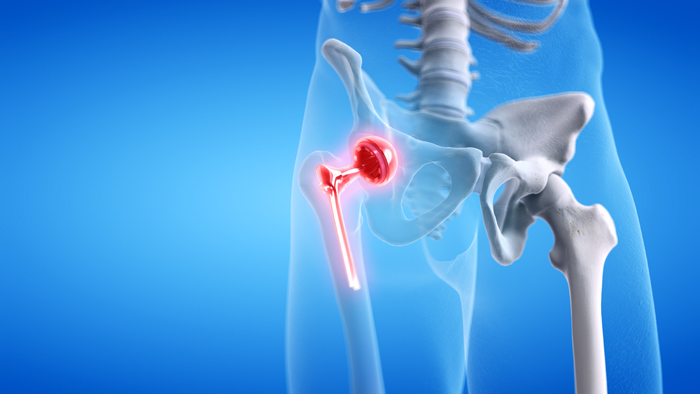Hip Replacement Surgery in Kondapur, Hyderabad
Hip replacement is a surgical procedure in which the surgeon at Apollo Kondapur will remove your hip joint’s damaged sections and replace them with parts that are constructed of ceramic, very hard plastic, or metal
Using this prosthesis will help improve function and reduce pain. Also known as total hip arthroplasty, a hip replacement procedure will be an option for you if your pain is interfering with daily activities and other forms of nonsurgical treatments haven’t been effective. One of the most common reasons why people get a hip replacement is arthritis damage.

What are the Causes?
There are certain conditions that damage the hip joint that can make hip replacement surgery important. These conditions include the following:
- Osteoarthritis - Also known as wear-and-tear arthritis, this condition damages the click cartilage covering the ends of the bones and helping the joints move smoothly.
- Rheumatoid arthritis - This condition is caused because of an overactive immune system. It produces a type of inflammation that erodes the cartilage and the underlying leaving behind deformed and damaged joints.
- Osteonecrosis - In case the ball portion of your hip joint doesn’t receive enough blood because of a fracture or a dislocation, the bone might get deformed and collapse.
Here are some other cases in which you have to consider hip replacement:
- Pain that is so discomforting that it makes dressing up going up and down the stairs, and rising from a seated position difficult.
- Pain that interferes with your sleep
- Pain that gets worse with walking, even with a walker or a cane
- Persistent pain even after taking pain medication
What are the complications of hip replacement?
Here are certain complications associated with the hip replacement procedure:
- Blood clots - After surgery, it is possible that clots form in your leg veins. This can be very dangerous as the clot might break off and travel to your heart, lungs, or even brain. To reduce this risk, doctors often prescribe blood-thinning medications.
- Infection - It is possible that infections occur at the incision site and in the deeper tissue. Most infections can be treated using antibiotics. However, if there is a major infection near your prosthesis, you might have to undergo another surgery for removing and replacing the prosthesis.
- Fracture - During the surgical procedure, the healthy positions of your joint might get fractured. In some cases, they are so small that they heal on their own. But, in the case of larger fractures, you might have to stabilize them with screws, wires, bone grafts, or metal plates.
- Dislocation - There are certain positions that can cause your new joint’s ball to get out of its socket, especially during the first few months after the procedure. If this happens, the doctor will have to fit you with a brace.
- Change in the length of the leg - There are some steps your doctor can take to avoid these problems. But, occasionally, because of the contracture of muscles around your hips, your new hip can make your one leg shorter or longer. Even if this happens, you will most likely not notice the difference after a few months.
- Nerve damage - In rare cases, the nerves present in the area where the prosthesis was planted might get injured resulting in pain, weakness, and numbness.
Eventually, your implement will wear out, especially if you have the procedure when you are relatively young. In this case, you have to undergo a second hip replacement procedure.
Request an appointment at Apollo Spectra Hospitals, Kondapur
Call 1860-500-2244 to book an appointment
What is the hip replacement procedure?
The procedure will begin with the surgeon injecting an anaesthetic in and around the joint or around the nerves to help block the pain after the procedure. Then, they will make a cut over the hip side or hip front via the tissue layers. Then, they will remove the damaged and diseased bone and cartilage and leave the one that’s healthy intact. Next, they will implant the prosthetic socket inside the pelvic bone and replace the affected socket. The round ball present on the top of the femur will be replaced by the prosthetic ball. This round ball will be attached to a stem that fits into the thigh bone.
This procedure can take several hours. However, today, hip replacement procedures have become a lot less invasive.
Once the procedure is completed, you will have to stay in a recovery area for a couple of hours during which your anaesthesia wears off. The staff will also monitor your pulse, blood pressure, pain, and alertness. In most cases, you will have to be admitted to the hospital for a few days.
Here are a few measures you can take to prevent blood clot formation:
- Move early
- Apply pressure by wearing inflatable air sleeves or compression stockings
- Take blood-thinning medications
- Have someone make your meals for you .
- Bring everyday items at the waist level so that you don’t have to reach up or bend down.
- Modify your home to suit your needs.
- Put the things that you commonly use in an area you will be spending most of your time in.
Symptoms
Our Top Specialities
NOTICE BOARD
CONTACT US
CONTACT US
 Book Appointment
Book Appointment


.svg)
.svg)
.svg)
.svg)








